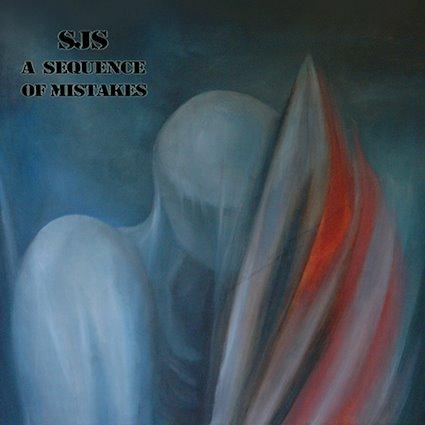Whether or not the lyrics Stuart Stawman writes and sings are autobiographical, the persona he’s created for himself as the leader of his neo-prog project SJS is that of a dutiful lover thwarted by the pressing of the self-destruct button no affair is without. That love is a game is a recurrent theme in Stawman’s songs and, of course, it means someone has to lose.
Stawman’s plaintive English voice, sometimes a husky warble, sometimes a falsetto cry, is the ideal medium for the romantic disillusion he expresses on the Australia-based combo’s third album. But here’s a thought – perhaps the “she” he’s pining for doubles as the woman of his dreams and the dying planet? A Sequence of Mistakes has a revisionist metaphysical space rock quality, like the stunning "End Trope”/”Circle Seat”/”Descent” suite with its existentially challenged astronaut on SJS’s 2017 debut The World Without.
The band's distinctive sound – its sonorous piano chords and ethereal surges frequently scorched by guitarist Douglas Skene’s acetylene riffing – is gorgeous, but Stawman has a tendency to disrupt its flow by altering the time signatures. The slow-quick-slow tempo can be disconcerting on first listen but it’s something you start to anticipate with pleasure; what it registers is romantic chaos.
It’s a surprise, then, that A Sequence of Mistakes starts with an Anathema-like call-and-response ballad, “Tear Gas”, featuring a crystalline lead vocal from new recruit Kirsty Forster, whose imperious kiss-off line,“There’s tear gas in your empathy/It means a lot, but not to me”, elicits Stawman’s wounded refrain “It’s not for want of trying”, sung as if he’s standing behind and below her, which, in a way, he is. New keyboardist Richard Naisbett's jazzy piano solo carries over into “The King of the Room”, which continues the reflective mood and resists even Skene scything into it. “Drift to Shore” is a delicate acoustic number with an Arabic lilt, Stawman biittersweetly accompanying what could be a mandolin.
Next we’re in the lap of the gods – the dark gods. Stawman’s death-deep distorted vocal on the diptych “Pulling Saturn”/”The Lamplighter” is sung over a twanging pulse and an unheavenly choir that prefaces eerie bell chimes, ominous plucking that spasms into a burst of gutsy rock and the singer's inchoate warrior call. The pulse returns – jabbed by electrical pings – before Graeme James’s snappy backbeat and the clamouring bells concede to a bellyaching guitar, more distant howling, and a low-mixed thrum. It’s an angsty but danceable 11 minutes, the best new piece I’ve heard this year since The Smile’s “Bending Hectic”.
On “Big Black & White”, Stawman induces pathos by contemplating domestic disarray and yearning for love again from a woman who “tore a hole in the sky/And let the whole world out’, until a heartbreaking piano and acoustic guitar duet (which suggests the influence of Mike Oldfield’s “Ommadawn”) restores some peace.
A Sequence of Mistakes is lusher and less playful in its songcraft than either The World Without or 2021’s circus-yThe Unlikely Event – though the serene electronics-and-piano throb of the latter’s instrumental “(In) Your Own Time” was a pointer to the new record’s mellower vibe (“Pulling Saturn”/”The Lamplighter” excepted). That's especially true of the finale, “Blue Sky Born”, a mutating 13-minute number about closure that allows the band, underpinned by Christopher Soulos’s growling bass, to get its groove on as Stawman and Forster trill angelically.
Like The Unlikely Event, the record ends on a hopeful note, the sky that “she” tore a hole in suddenly a portal for “him” to leave through – love being done with for now. And yet, “There’s a sequence of mistakes/I wish we could have made,” Stawman sings cryptically. Maybe next time?














Add comment